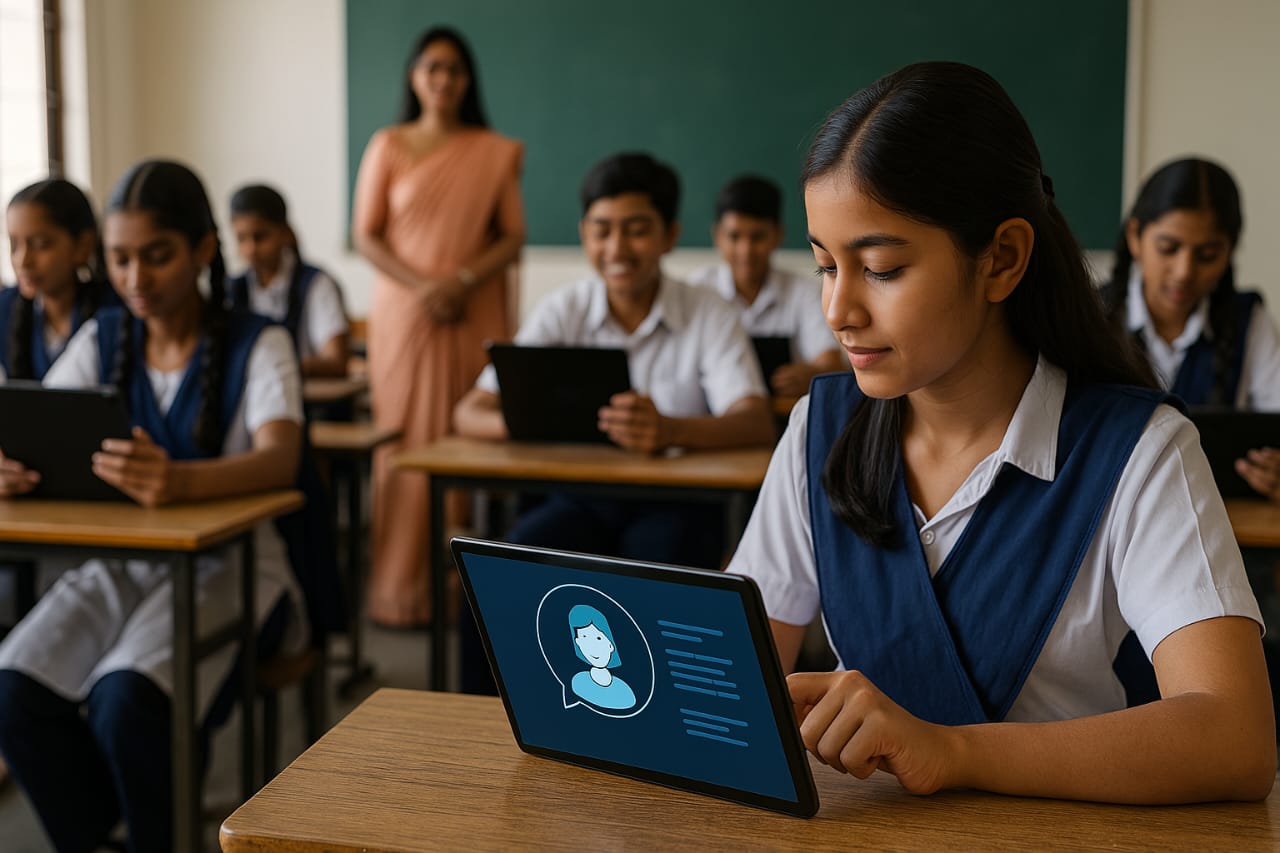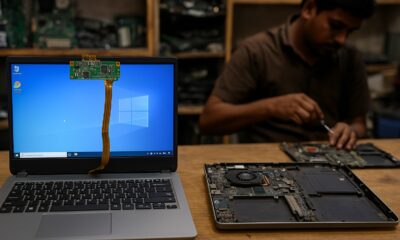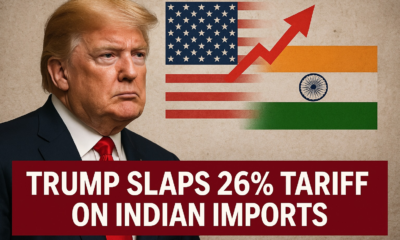Education
AI in Indian Classrooms: Transforming the Future of Learning
Artificial Intelligence is reshaping how Indian students learn and teachers teach. From AI teaching assistants to personalized learning tools, classrooms across India are evolving into smart, adaptive environments.

India’s classrooms are undergoing a quiet revolution — powered not by chalk and board, but by Artificial Intelligence (AI). As education embraces the digital era, AI is emerging as a powerful tool that is personalizing learning, improving accessibility, and redefining how students engage with content.Across schools and colleges in urban and rural India, AI is no longer just a buzzword — it’s becoming a daily reality.
One of the most promising innovations is the use of AI-powered teaching assistants. Take the example of Alice, a voice-activated AI bot developed by students at Bhubanananda Odisha School of Engineering. Alice can assist in answering scientific queries for up to six hours a day, pulling answers from large AI models like ChatGPT. Such tools are helping teachers manage large classrooms more effectively while giving students the freedom to explore learning at their own pace.
Meanwhile, edtech platforms like MindCraft and EdSaarthi are building AI-based personalized learning engines that adapt to a student’s level, strengths, and learning gaps — delivering content that is tailored, dynamic, and data-driven.
These innovations are not confined to elite institutions. With government initiatives like ‘AI for All’ and the AI Curriculum by CBSE, efforts are being made to integrate AI learning from as early as Class 8, making sure Indian students are not just AI consumers but future creators.
The impact is visible:Students in remote areas are now accessing AI-powered revision tools and doubt solversTeachers are using automated assessment tools to generate quizzes and analyze performanceSchools are experimenting with AI chatbots for career counseling and concept explanationInstitutions like Universal AI University in Maharashtra are going a step further — embedding AI as a core module across undergraduate and postgraduate programs.
Of course, challenges remain. Not every school has access to digital infrastructure. Concerns around data privacy, bias in algorithms, and teacher training need to be addressed. But the momentum is clear: AI is no longer a futuristic concept in Indian education — it’s the present.
As India moves toward a more inclusive and technologically enabled education system, AI offers a unique opportunity to bridge gaps, improve outcomes, and truly personalize learning for every student, everywhere.
Education
NEET UG 2025 Admit Cards Released by NTA — Here’s How to Download
NTA has released the NEET UG 2025 admit cards on 30 April 2025. Candidates can download from neet.nta.nic.in using login credentials. Exam scheduled for 4 May 2025.

The National Testing Agency (NTA) has released the admit cards for the National Eligibility cum Entrance Test (NEET-UG) 2025 today, April 30, 2025. The exam is scheduled to be held on Sunday, May 4, 2025, from 2:00 PM to 5:00 PM IST.
Candidates can now download their admit cards from the official NEET website: https://neet.nta.nic.in using their login credentials.
The admit card contains important details such as exam centre location, exam timing, and candidate instructions. Candidates are advised to carefully read the information bulletin and guidelines mentioned in the admit card.
In case of any issues while downloading the admit card, students can reach out to the NTA helpdesk at 011-40759000 / 011-69227700 or email at neetug2025@nta.ac.in.
For further updates, visit the official websites:
Business
Hooked Young: The Growing Drug Crisis Among Youth in South India
From schoolbags hiding MDMA pills to vapes disguised as candy, a silent epidemic is gripping teenagers across South Indian states. Experts warn that the drug supply chain is faster and smarter than ever — and children are the new target.

What began as whispers in hostel corridors has now escalated into a full-blown public health and policing concern. Southern states like Kerala, Karnataka, and Tamil Nadu are witnessing an alarming rise in synthetic drug abuse, with teenagers and young adults at the center of the crisis.
In a recent viral tweet, retired Air Marshal Anil Chopra flagged the disturbing trend: MDMA pills being sold in candy-like packaging, local supply chains delivering narcotics within hours, and children experimenting with highly addictive substances disguised as harmless fun.
The Drugs of Concern
- MDMA (Ecstasy): Marketed under names like Blue Butterfly, Tesla, or Superman, these designer drugs are being distributed in schools and colleges. Often colorful and candy-shaped, they lower inhibitions and increase the risk of dependence.
- Vapes Laced with THC or Synthetic Nicotine: Marketed as “flavored” devices, these are becoming a gateway for school-going children, especially in urban centers like Bengaluru and Kochi.
- LSD Tabs and Cocaine Microdoses: Previously seen only in high-end party circles, these are now available on encrypted Telegram groups with “guaranteed delivery” across Tier 2 cities.
The Modus Operandi: Fast, Digital, Hidden
Dealers are adapting. Using platforms like Instagram DMs, Telegram groups, and even food delivery-style drop services, narcotics are being dispatched faster than pizza. The buyers? School and college students with access to UPI wallets or crypto payments.
Ground Reports: What Police and Parents Are Saying
In Kerala, over 3,000 drug-related arrests were made in 2023 alone — a large number involving juveniles. A senior narcotics officer noted, “These aren’t hardened criminals. Many are 15–17-year-olds from decent families, trapped by peer pressure and tech-savvy peddlers.”
Parents are often unaware until too late. “We thought it was an energy drink or a protein supplement,” said one mother from Kozhikode whose son was hospitalized after consuming a THC-infused vape.
Why It’s Spreading
- Peer pressure + social media glamorization
- Easy access through quick delivery models
- Lack of awareness among parents and teachers
- Delayed regulatory enforcement on vaping and new synthetics
What’s Being Done
- Kerala and Tamil Nadu police have launched school-level awareness campaigns
- NCB and local enforcement are tracking crypto-linked drug deals
- New bans on flavored vape imports have been enforced, but black-market supply continues
- Mental health NGOs are stepping in with rehab and counseling support in colleges
Conclusion
This isn’t just a law-and-order issue — it’s a youth emergency. Unless parents, schools, governments, and tech platforms act in unison, a generation risks being lost to addiction dressed in glitter. The need of the hour is not just crackdowns but conversation, prevention, and support.
Books
India’s Reading Renaissance: How Books Are Making a Comeback in the Digital Age
Despite the rise of screens and short-form content, India’s book culture is experiencing a quiet but powerful revival. From Gen Z readers to tier-2 bookstores, the love for literature is being rekindled — both online and off.

At a time when Instagram Reels, YouTube Shorts, and AI-powered content dominate attention spans, one might assume that books have taken a backseat in modern India. But the reality tells a different story. Across metros and small towns, there’s a rising wave of reading revival — powered by new-age publishing, regional authors, influencer-led book communities, and a growing thirst for authenticity.
Whether it’s business books by Indian startup founders, self-help titles in Hindi, or viral BookTok recommendations, India’s book sales have steadily grown over the past two years. E-commerce platforms, audio-books, and mobile reading apps are helping Gen Z and millennials rediscover reading — not just as a hobby, but as a lifestyle choice.
One key driver of this resurgence is the rise of Indian voices and vernacular storytelling. Readers are increasingly seeking out relatable content — be it regional language fiction, biographies of Indian entrepreneurs, or books decoding ancient wisdom like the Arthashastra and Bhagavad Gita for modern audiences. Homegrown publishing houses and self-publishing platforms have further democratized access.
Offline, independent bookstores and reading cafés are making a comeback. Cities like Bengaluru, Pune, and Lucknow are seeing community-driven book clubs, author events, and reading marathons bring readers together in analog ways.
This revival isn’t just cultural — it’s commercial too. The Indian book market is projected to reach ₹1,000 crore by 2026, with significant growth in children’s books, competitive exam material, and non-fiction categories.
In a noisy digital world, books offer what few mediums can — depth, perspective, and reflection. As more Indians look to unplug, re-focus, and self-educate, the humble book is finding its place back in the spotlight.
-

 Business2 months ago
Business2 months agoIndia and U.S. Join Forces to Build Semiconductor Fabrication Hubs for Strategic Tech Leadership
-

 Auto2 months ago
Auto2 months agoIndia’s EV Push Gets a Boost with New ₹5,000 Cr Government Incentive Scheme
-

 Business2 months ago
Business2 months agoMedia in Meltdown: Inside the Financial Freefall of India’s Newsrooms
-

 Business2 months ago
Business2 months ago‘Frankenstein’ Laptops Rise in Delhi’s Repair Markets as Budget Tech Finds New Life
-

 Uncategorized12 months ago
Uncategorized12 months agoRanveer Brar in conversation with Shantanu Prakash | Business Class
-

 Education2 months ago
Education2 months agoNEET UG 2025 Admit Cards Released by NTA — Here’s How to Download
-

 Business2 months ago
Business2 months agoTrump Slaps 26% Tariff on Indian Imports, Triggering Tensions in Indo-U.S. Trade Ties
-

 Tech2 months ago
Tech2 months agoIndia Unveils $2.7 Billion PLI Scheme to Boost Electronics Manufacturing and Job Creation






